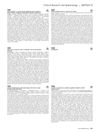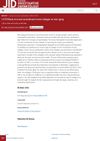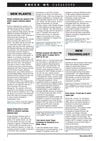Search
for
Sort by
Research
900-930 / 1000+ resultsresearch Trichogenic Effect of Low Level Laser Therapy Combined with Platelet-Rich Plasma for the Management of Androgenetic Alopecia
Combining laser therapy with platelet-rich plasma improves hair growth in people with hair loss.

research Nailfold Capillaroscopy Alterations in Androgenetic Alopecia: A Cross-Sectional Study
Men with androgenetic alopecia, or hair loss, often have abnormal blood flow in their small blood vessels, which might be linked to inflammation and stress.
research MTHFR C677T Polymorphism and Serum Homocysteine Level as Risk Factors of Coronary Heart Disease in Patients with Androgenetic Alopecia: A Case-Control Study
Androgenetic alopecia is linked to a higher risk of coronary heart disease due to certain genetic factors and high homocysteine levels.
research Medical Treatments for Androgenetic Alopecia

research Serum Levels of Retinol-Binding Protein 4 and Adiponectin in Women with Polycystic Ovary Syndrome: Associations with Visceral Fat but No Evidence for Fat Mass-Independent Effects on Pathogenesis in This Condition
Women with PCOS have similar levels of certain proteins compared to women without PCOS, and these proteins don't independently cause PCOS.
research Lung Cancer Chemoprevention with Retinol Palmitate: Preliminary Data from a Randomized Trial on Stage Ia Non-Small-Cell Lung Cancer
Retinol palmitate may reduce cancer relapses in early-stage lung cancer patients.

research Possible Immunomodulating Effect of Retinol on Cytokine Secretion in Patients with Recurrent Furunculosis
Retinol may affect immune responses in people with frequent skin boils.

research Inhibition of the Pro-Oxidant Effects of Benoxaprofen on Polymorphonuclear Leucocytes by Retinol Acetate In Vitro
Retinol acetate can reduce the harmful effects of the drug benoxaprofen on white blood cells.

research Effect of Alpha-Tocopheryl Acetate, Retinyl Palmitate, and Phytantriol on Hair Protection
TRP-hair essence protects hair from heat damage, maintains color, and strengthens hair.

research Retinol-Binding Protein 4, Leptin, and Insulin Resistance in Idiopathic Hirsutism and Hirsute Women with Polycystic Ovary Syndrome
Women with idiopathic hirsutism and PCOS have higher RBP4 levels, and PCOS is linked to greater insulin resistance; weight management may help both conditions.

research Epidermal Retinol Dehydrogenases Cyclically Regulate Stem Cell Markers and Clock Genes and Influence Hair Composition
Enzymes involved in Vitamin A metabolism affect hair growth and type in mice.
research Serum Level of Retinol-Binding Protein 4 in Alopecia Areata: Relation with Recurrence and Severity
Higher levels of retinol-binding protein 4 are found in people with alopecia areata, but these levels don't relate to how severe the condition is.

research Retinol Remarkably Effective in Reducing Neck Wrinkles
Retinol significantly reduces neck wrinkles.

research Assessment of Retinol-Binding Protein 4 in Patients with Alopecia Areata and Androgenetic Alopecia
Higher RBP4 levels found in people with two types of hair loss.

research Effects of Dobutamine on Cyclic AMP Accumulation Induced by the Stimulation of Dopamine Receptors in Rabbit Retina In Vitro
Dobutamine does not mimic dopamine at therapeutic doses but may at very high concentrations; microfilaments, not microtubules, are important for wound healing in Xenopus embryos.
research Dietary Habits in Japanese Patients with Alopecia Areata
Japanese patients with alopecia areata often have a higher BMI and consume more vitamin C, fruit, and retinol, which may affect their condition's development or severity.
research Case Report: Vitamin A Toxicity and Hypercalcemia
Vitamin A toxicity likely caused the patient's high calcium levels.
research Safety of High-Dose Vitamin A
High-dose vitamin A was safe and well-tolerated in a lung cancer treatment study.
research The Stability of Vitamin A-Induced Metaplasia of Mouse Vibrissa Follicles In Vitro
Excess vitamin A causes lasting gland changes in mouse hair follicles.
research In Vitro and Ex Vivo Examination of Topical Pomiferin Treatments
Pomiferin may improve skin and hair by increasing important protein production.

research Integrated Transcriptomics and Metabolomics Analyses of Stress-Induced Murine Hair Follicle Growth Inhibition
Chronic stress in mice changes skin metabolism and gene expression, leading to hair loss.

research Anti-Aging Effects of Retinoid Hydroxypinacolone Retinoate on Skin Models
Hydroxypinacolone retinoate is a potent anti-aging ingredient for skin that is more effective and less irritating than other forms of retinoids.
research Effects of Acute UVB on Retinoid Metabolism
UVB exposure increases skin proteins for retinoic acid synthesis and shifts their location, possibly affecting skin repair.

research Elucidating Causal Relationships of Diet-Derived Circulating Antioxidants and the Risk of Non-Scarring Alopecia: A Mendelian Randomization Study
Higher levels of β-carotene and vitamin E may help prevent certain types of hair loss.

research Effects of a New Recombinant Human Collagen on Skin Aging
The new recombinant human collagen can help slow skin aging and repair skin, while also controlling inflammation.

research Dermatological Benefits of Cosmetics
Cosmetics can help with mild skin problems and daily care but must be used carefully to avoid skin irritation.

research Pomiferin: A Potent Stimulant of Extracellular Matrix Proteins
Pomiferin may improve skin and scalp health by boosting important protein expression.
research Clinical Study on the Efficacy and Safety of Scalp Med in Patients with Androgenetic Alopecia
Scalp med(R) effectively and safely improves hair count and thickness in men with androgenetic alopecia.
research DGAT1 Modulates Hair Cycling and Is Essential for Retinoid Homeostasis in the Skin
The enzyme Dgat1 is essential for healthy hair and skin by controlling retinoid levels.